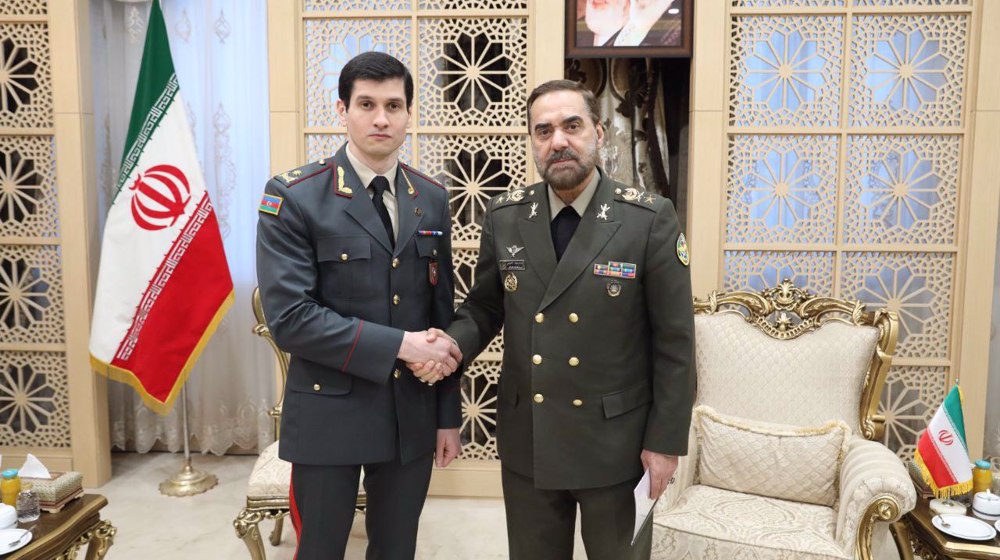Ceasefire fails to end Karabakh hostilities
Armenia and Azerbaijan have both reported bouts of fighting despite the announcement of a unilateral ceasefire by Baku in the disputed border region of Nagorno-Karabakh.
Armenia’s Defense Ministry released a statement on Sunday which said heavy fighting continues on both sides of the front line where Azerbaijan has “concentrated sizable forces.”
It also said that Armenian forces had launched a counter attack on a strategic area located close to the village of Talish in the Martakert region.
Regional authorities in Martakert also announced that Azerbaijani shelling has been going on continuously for the past 24 hours.
Based on social media reports, residents have been forced to abandon the city, which lies some three kilometers from the front line.

Azerbaijan has also accused Armenia of violating the ceasefire and continuing its shelling along the contact line which separates the two sides.
Earlier, the Azeri government announced the implementation of a unilateral ceasefire, although it warned of retaliation in case of an attack.
Azerbaijan announced Saturday that 12 of its troops had been killed and Armenia said 18 had lost their lives in the violence which started overnight Friday.
The Armenian Defense Ministry said that Azeri forces initiated an overnight offensive, using tanks, artillery and military aircraft in a bid to make inroads into Nagorno-Karabkh.
Stoking war flames
Meanwhile, Armenian Deputy Foreign Minister Shavarsh Kocharyan blamed Turkey for supporting the continuation of clashes in the disputed region, saying, "It's a pity that for Turkey the importance of human lives is determined by the nationality. With such racist statements, Turkey encourages the continuation of the aggressor's action against the self-proclaimed Nagorno- Karabakh Republic."
“Turkey’s racist stance only adds fire to the violence,” said Kocharyan.

Turkish President Recep Tayyip Erdogan (pictured above) said earlier he would support Azerbaijan “to the end” and that “we pray our Azerbaijani brothers will prevail in these clashes.”
This is while the United Nations as well as world powers and regional countries, including the United States, Russia, and Iran, have called for an immediate end to the clashes, which have sporadically continued since a bloody war that ended in 1994.
Following the recent escalation in the disputed region, Azerbaijan’s ambassador to Russia said the country was frustrated with the decades-long process of negotiations under the Organization for Security and Cooperation in Europe and was ready to resort to "military means."
“The attempts of a peaceful solution to this conflict have been underway for 22 years. How much more will it take? We are ready for a peaceful solution to the issue. But if it’s not solved peacefully then we will solve it by military means,” said Polad Bulbuloglu.
'Interest' in war resumption
The ethnic clashes that began in the late 1980s and left tens of thousands dead by May 1994 have ever since been continuing in the landlocked South Caucasus region, claimed by Azerbaijan and governed by the Nagorno-Karabakh Republic.

Thomas de Waal, a senior associate at the Carnegie Endowment for International Peace and an expert on the conflict, however, believes that the recent outbreak of hostilities is “much more serious” than the usual clashes that resume each spring.
“It is more likely that one of the two parties to the conflict — and more likely the Azerbaijani side, which has a stronger interest in the resumption of hostilities — is trying to alter the situation in its favor with a limited military campaign,” de Waal told the Washington Post.
On Saturday, Iran’s Foreign Ministry Spokesman Hossein Jaberi Ansari said that Tehran calls on both of its northern neighbors to “refrain from any manner or action” which could "worsen the situation."
Karabakh region, which is located in the Azerbaijan Republic but populated by Armenians, has been under the control of local ethnic Armenian militia and the Armenian troops since a ceasefire through Russian mediation.
Last December, the Armenian Defense Ministry said the 1994 deal was no longer in place, saying the current situation amounted to “war.”
Although the two countries are divided by a buffer zone, both sides frequently accuse one another of violating the ceasefire.
VIDEO | Iran's president urges Pope to help end Israel's onslaught in Gaza
Iran's senior legal official: ICC arrest warrants for Netanyahu ‘great victory'
Nov. 21: ‘Axis of Resistance’ operations against Israeli occupation
VIDEO | Israeli forces storm West Bank’s Jenin again, target civilians
Iran activates advanced centrifuges after IAEA's 'unjust' resolution
VIDEO | Press TV's news headlines
Iran FM: Response to Israeli aggression 'inevitable'
VIDEO | Iran eases the rules for exporting hand-woven carpets















 This makes it easy to access the Press TV website
This makes it easy to access the Press TV website